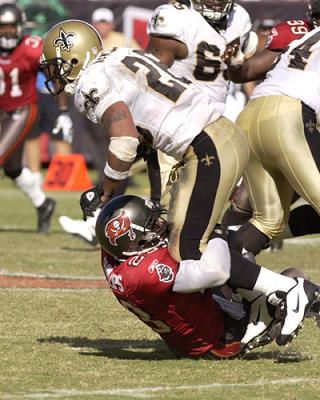|
|
 |
 Marty Strasen, The Tampa Tribune, published 3 November 2003
Marty Strasen, The Tampa Tribune, published 3 November 2003
The second half of the Bucs season will start just the way the first one did, with a road game against a team longing to steal their crown. Two months ago, who would have guessed that the Carolina Panthers would be a better bet than the Bucs - or Tampa Bay's season-opening foe, Philadelphia, for that matter - to reach the Super Bowl? Such is the state of Bucs football in their first year since winning Super Bowl XXXVII.
The 2001 Super Bowl champion New England Patriots failed to make the playoffs the following year. The 4-4 Bucs will likely duplicate the feat if they are unable to steal a win against 6-2 Carolina on Sunday. The good news for the Bucs is that they are scheduled to win their next game, according to the pattern they've followed thus far: W, L, W, L, W, L, W, L. The bad news is that no 8-8 team has ever won the Super Bowl, and it's not a very good way to reach the playoffs either.
So how did Tampa Bay go from the NFL's highest peak to the Mendoza line in two months of football? Let us count the ways.
1. Injuries. It's not an excuse. It's a fact. The Bucs stayed remarkably healthy last year. This season, the law of averages has caught up with them. Third receiver Joe Jurevicius has been out since Week 2, and the offense has struggled because of it. A list of the Bucs' defensive injuries nearly requires a table of contents. All one needs to know is this: David Gibson, a safety signed just last week, was in the secondary trying to stop the Saints in the fourth quarter of Sunday's 17-14 loss. John Lynch, Brian Kelly and Jermaine Phillips were not.
2. Lack of focus. Some have said the Bucs' complacency is obvious. Complacency is not the right word, though. Tampa Bay's veterans long to defend their title as much as any champion has. But the attention to detail clearly has not been evident. All the Bucs had to do was execute a PAT to beat the Panthers in September. They failed. All they needed against the Colts was to make a play or two to stifle a 21-point comeback. They failed. To beat the Saints, the Bucs needed to protect the football and stop the run. Failure, on both counts. If highly publicized nonsense involving Keyshawn Johnson and Warren Sapp has not been a distraction, it certainly has not helped. Last year's Bucs rallied around one another. This year's Bucs have not.
3. The offensive line. Have we heard this before? The 2002 Bucs struggled mightily up front, but the line's late-season surge propelled the team to a championship. This year, the problem has been inconsistency from one game to the next. The line blocked well in the opener at Philly, but since then Coach Jon Gruden has been unable to predict which plays will work. Injuries have hurt here, too. Without LT Roman Oben against the Saints, Tampa Bay had four players starting in different spots than the pregame depth chart indicated. However, those players were Kenyatta Walker, Kerry Jenkins, Cosey Coleman and Cornell Green. All have plenty of experience. Their inability to handle New Orleans' defense was inexcusable.
4. Finally, something has to be said about the state of the today's NFL. There is little room for error in a league where every team is capable of beating every other team on a given week. Fans tend to like parity, because their favorite team can always be a year or two away from a Super Bowl run. On the flip side, a season like the Bucs are having can be right around the corner for any Super Bowl champion. A bad break here, a missed assignment there, and the walls can come crumbling down in a hurry. Tampa Bay knows all too well.
If the Bucs make that extra point against Carolina and hold their three-TD lead against the Colts, they're 6-2 and in first place at the midway point. They did not, of course, and now they're here, reeling, in need of a win simply to maintain their hope of returning to the playoffs and trying to make amends for a half-season they never could have imagined.
|

|
|
| |
| |
|